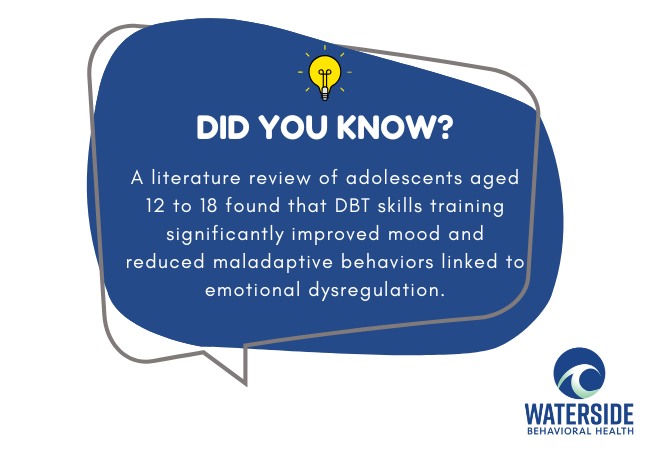The fast pace of modern life doesn’t allow much room for error, emotional overwhelm, or downtime. And yet, these things are inevitable. Whether it’s workplace pressures, personal relationships, health concerns, or unresolved trauma, our minds and bodies can become easily overstimulated and emotionally dysregulated. If you often feel stuck in reactive cycles, struggle to manage overwhelming emotions, or find yourself paralyzed by anxiety, you’re not alone.
Dialectical Behavior Therapy (DBT) offers a way forward—an evidence-based therapeutic approach designed to help people manage stress, reduce emotional reactivity, and improve their quality of life. Unlike talk therapy that primarily focuses on insight and reflection, DBT is rooted in practical, day-to-day skills that empower individuals to take charge of their mental and emotional health. Through its structured framework, DBT teaches people how to accept the things they cannot change while actively working to change the things they can.
The Power of a Skill-Based Approach
DBT is built around the concept of balancing acceptance and change. It recognizes that we must acknowledge our emotional experience in order to transform it. This framework is especially helpful for people with heightened emotional sensitivity, mood disorders, and anxiety, because it emphasizes action steps that can be taken in the moment—not just reflections made afterward.
Each of the DBT skills—mindfulness, distress tolerance, emotional regulation, and interpersonal effectiveness—is designed to help individuals build a more stable and meaningful life. These aren’t abstract theories—they’re strategies you can apply today to navigate challenges, build resilience, and prevent emotional spirals.
Many mental health treatment programs in Massachusetts incorporate DBT skills into their broader therapeutic models, recognizing their ability to bridge gaps between diagnosis and daily functionality.
Mindfulness as a Grounding Tool
Mindfulness is the foundation of all DBT skills. It teaches us how to observe and describe our experiences without judgment, and how to return our attention to the present moment when the mind wanders.
In practical terms, this can look like:
-
Taking a mindful breath when you feel overwhelmed instead of reacting impulsively.
-
Observing your thoughts as passing clouds rather than absolute truths.
-
Bringing full attention to an everyday task, like washing dishes, to anchor yourself in the moment.
When someone is working through chronic worry or excessive rumination, mindfulness becomes a daily anchor. It supports clarity and calm—two qualities often missing in anxious states. Individuals in anxiety treatment in Massachusetts often find that developing this skill leads to better sleep, emotional stability, and a greater sense of control over their lives.
Distress Tolerance: Enduring the Difficult Moments
Some emotions feel unbearable. Anger, sadness, fear, or guilt can lead people to act impulsively or seek escape through unhealthy behaviors. DBT’s distress tolerance skills offer strategies for surviving emotional storms without making things worse.
These techniques include:
-
Distraction: Temporarily redirecting your attention to something else when emotions are intense.
-
Self-soothing: Using sensory experiences—like calming music, warm baths, or comforting scents—to comfort yourself.
-
TIPP skills: These involve physiological strategies such as holding ice, splash cold water on your face, or engaging in short bursts of intense physical activity to regulate your nervous system.
Individuals with unresolved emotional wounds often find additional benefit from integrating these skills alongside trauma therapy in Massachusetts, where both emotional endurance and long-term healing are prioritized.
Emotion Regulation: Understanding and Influencing Feelings
Emotional regulation involves recognizing what you’re feeling, understanding the causes, and making choices that reflect your values and needs. It’s about moving from “I’m angry, so I’ll yell” to “I notice I’m angry, and I’ll take a moment before I respond.”
Skills in this category include:
-
Identifying and labeling emotions: Naming an emotion reduces its power and brings clarity.
-
Checking the facts: Are your thoughts aligned with reality, or are they colored by assumptions or fears?
-
Building positive experiences: Scheduling enjoyable activities daily to create emotional momentum.
These techniques work well for those undergoing depression therapy in Massachusetts, who often experience emotional numbness or extreme mood swings. Learning how to shift and manage internal states can significantly improve motivation and overall mood stability.
Interpersonal Effectiveness: Building Healthy Relationships
Conflict, unmet needs, or emotional invalidation from others can significantly contribute to stress and anxiety. DBT’s interpersonal effectiveness skills help individuals express themselves clearly, set boundaries, and maintain self-respect—all without damaging relationships.
You might use:
-
DEAR MAN to assert yourself calmly but firmly.
-
GIVE skills (Gentle, Interested, Validate, Easy manner) to strengthen connections with others.
-
FAST skills (Fair, Apologies not overused, Stick to values, Truthful) to uphold self-respect.
For individuals balancing therapy, relationships, and self-advocacy, these tools offer confidence in communication. Many programs offering dialectical behavior therapy in Massachusetts use role-playing and coaching to help clients practice these scenarios and gain mastery in real life.

The Value of Integrative Therapy Approaches
While DBT is powerful on its own, it gains even more effectiveness when used alongside other therapeutic frameworks. Mental health conditions rarely exist in isolation; a person dealing with anxiety may also struggle with past trauma, mood fluctuations, or low self-esteem.
Integrated care may involve:
-
Combining DBT with CBT to examine and shift core thought patterns.
-
Using trauma-informed therapy to process underlying wounds that influence current emotional responses.
-
Including family therapy when relational dynamics need repair or improvement.
-
Leveraging psychiatric support for medication management, particularly in cases of severe anxiety or depression.
In comprehensive mental health treatment programs Massachusetts providers often tailor a blend of therapies based on each individual’s goals and diagnoses. DBT can be a central piece of this puzzle, offering daily stability while other modalities address deeper-rooted patterns.
Why Choose Waterside Behavioral Health?
When navigating the path to mental wellness, the right support system can make all the difference. At Waterside Behavioral Health, we understand that mental health is personal, complex, and ever-evolving. That’s why we take a personalized and comprehensive approach to care, integrating evidence-based therapies with human compassion.
We specialize in helping individuals regain emotional control through structured therapeutic programs that feature proven methodologies like cognitive-behavioral therapy in Massachusetts and dialectical behavior therapy (DBT). Our clinicians are highly trained in DBT skill training and are committed to helping clients not only understand their emotional triggers but also respond to them with purpose and self-respect.
Our programs are structured to meet a range of mental health needs, whether you’re managing a long-standing anxiety disorder, working through past trauma, or struggling with depression. We take pride in offering a safe and inclusive space where clients feel empowered to actively participate in their healing.
Conclusion
Stress and anxiety are part of life—but they don’t have to dominate it. Dialectical Behavior Therapy offers a lifeline to those who feel overwhelmed, emotionally reactive, or trapped in patterns they can’t seem to break. With the right tools, support, and guidance, it’s possible to reduce emotional suffering and face life’s challenges with strength, clarity, and confidence. Whether you’re new to therapy or looking to deepen your mental health work, DBT skills provide practical, real-world strategies that make a difference. From mindful breathing to setting boundaries and tolerating distress, these tools empower you to respond—rather than react—to the situations life throws your way.
At Waterside Behavioral Health, we combine DBT with a range of evidence-based practices to help our clients find lasting relief and renewed hope. If you’re ready to take that next step, we’re here to walk with you—every moment, every emotion, every breakthrough. Call Waterside Behavioral Health today at (774) 619-7750 to learn how our mental health treatment center in Massachusetts can support your journey toward healing and emotional resilience.
Frequently Asked Questions (FAQs)
What is Dialectical Behavior Therapy (DBT)?
DBT is a type of psychotherapy that combines elements of behavioral therapy, mindfulness, and cognitive approaches. It helps individuals regulate emotions, tolerate distress, and improve interpersonal relationships—making it especially effective for those struggling with chronic stress or anxiety.
How do DBT skills help manage anxiety and stress?
DBT teaches coping strategies such as mindfulness, distress tolerance, emotion regulation, and interpersonal effectiveness. These tools help individuals respond to stress more effectively and reduce the intensity and frequency of anxiety symptoms.
Can I practice DBT skills on my own?
Yes, many DBT techniques can be practiced independently, especially once you’ve learned the basics through therapy or a structured program. Skills like deep breathing, radical acceptance, and grounding exercises can be incorporated into daily routines.
Is DBT suitable for people with depression or trauma?
Yes. DBT has proven effective in treating not only anxiety but also depression, trauma, and other emotional disorders. It’s often combined with other therapies to provide a more comprehensive treatment plan tailored to the individual’s needs.
What makes Waterside Behavioral Health a good choice for DBT?
Waterside Behavioral Health offers specialized care through expert clinicians trained in DBT and other evidence-based therapies. We tailor treatment plans to your specific mental health needs and provide compassionate, ongoing support in a safe and welcoming environment.




